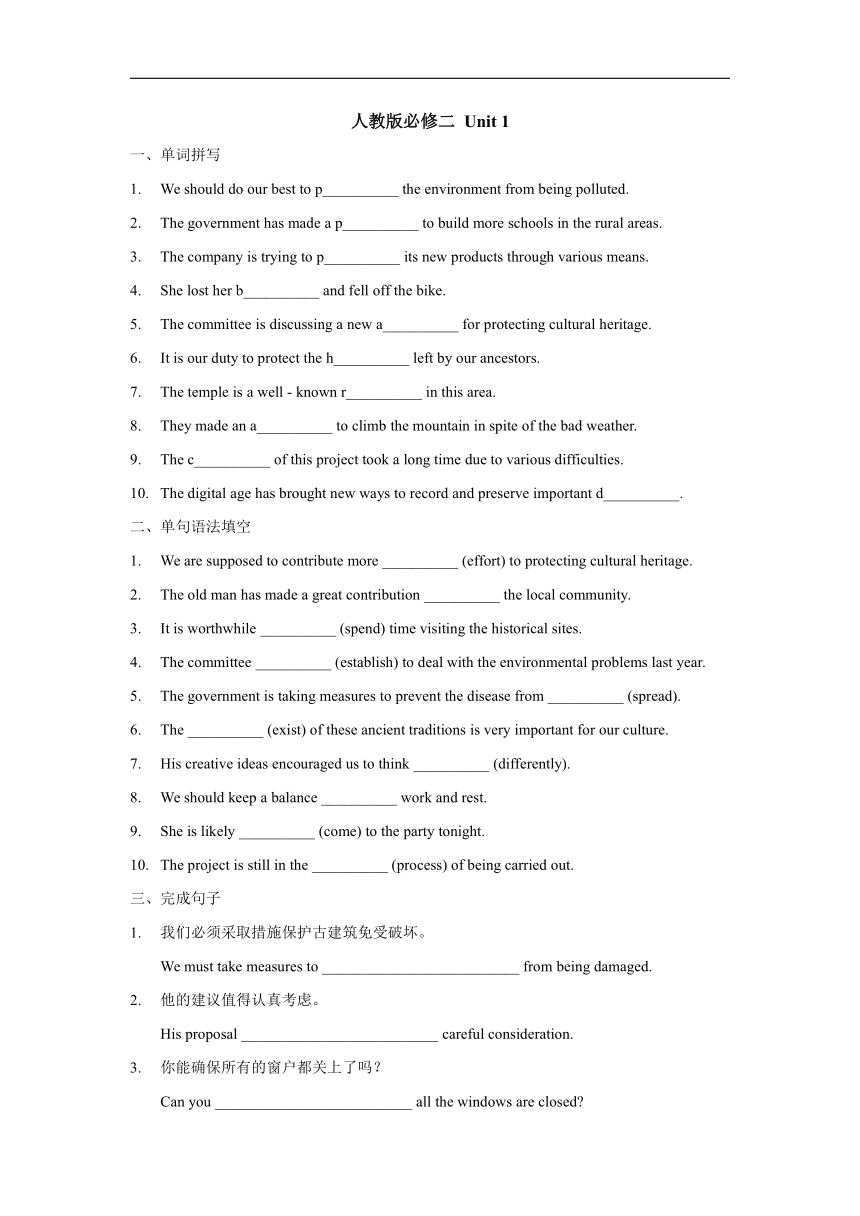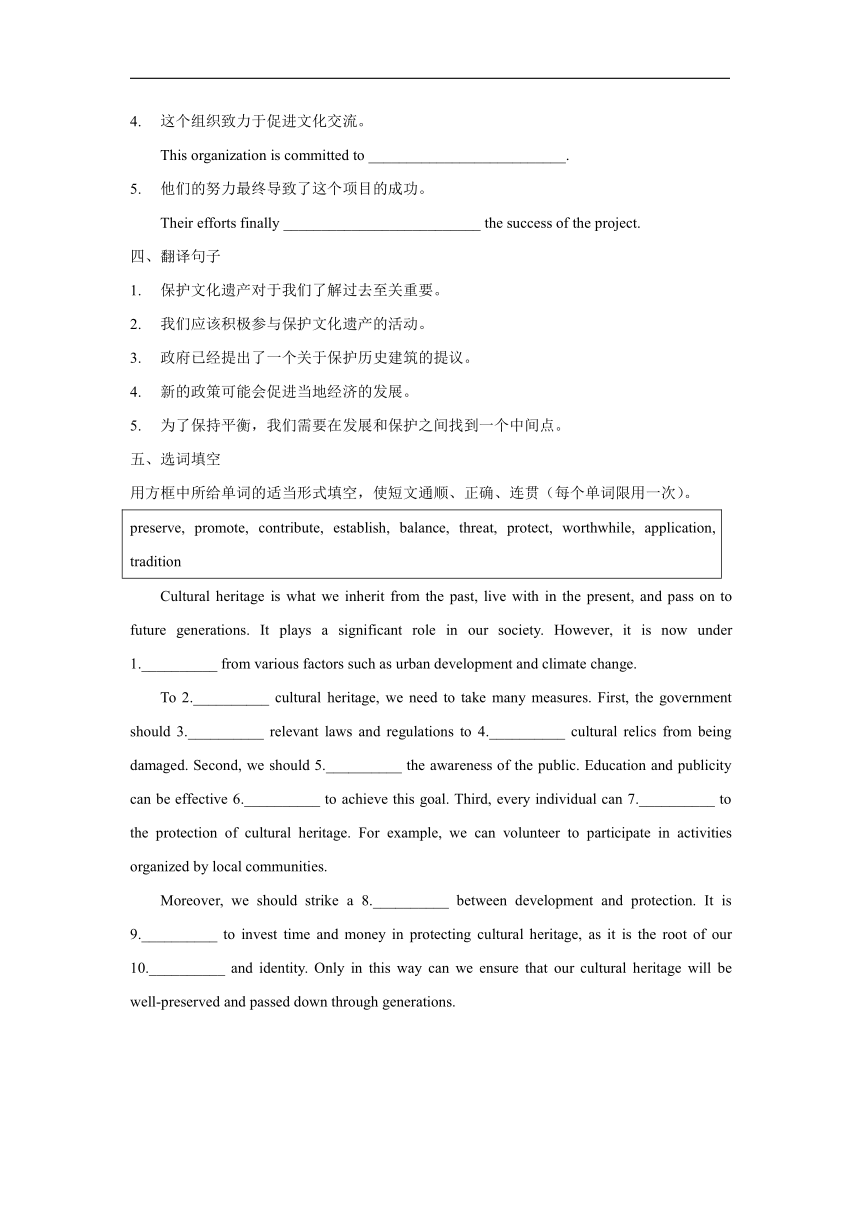Unit1 Cultural Heritage词汇训练(含答案)-2025-2026学年高中英语人教版(2019)必修第二册
文档属性
| 名称 | Unit1 Cultural Heritage词汇训练(含答案)-2025-2026学年高中英语人教版(2019)必修第二册 |

|
|
| 格式 | docx | ||
| 文件大小 | 26.6KB | ||
| 资源类型 | 教案 | ||
| 版本资源 | 人教版(2019) | ||
| 科目 | 英语 | ||
| 更新时间 | 2025-07-28 00:00:00 | ||
图片预览


文档简介
人教版必修二 Unit 1
一、单词拼写
We should do our best to p__________ the environment from being polluted.
The government has made a p__________ to build more schools in the rural areas.
The company is trying to p__________ its new products through various means.
She lost her b__________ and fell off the bike.
The committee is discussing a new a__________ for protecting cultural heritage.
It is our duty to protect the h__________ left by our ancestors.
The temple is a well - known r__________ in this area.
They made an a__________ to climb the mountain in spite of the bad weather.
The c__________ of this project took a long time due to various difficulties.
The digital age has brought new ways to record and preserve important d__________.
二、单句语法填空
We are supposed to contribute more __________ (effort) to protecting cultural heritage.
The old man has made a great contribution __________ the local community.
It is worthwhile __________ (spend) time visiting the historical sites.
The committee __________ (establish) to deal with the environmental problems last year.
The government is taking measures to prevent the disease from __________ (spread).
The __________ (exist) of these ancient traditions is very important for our culture.
His creative ideas encouraged us to think __________ (differently).
We should keep a balance __________ work and rest.
She is likely __________ (come) to the party tonight.
The project is still in the __________ (process) of being carried out.
三、完成句子
我们必须采取措施保护古建筑免受破坏。
We must take measures to __________________________ from being damaged.
他的建议值得认真考虑。
His proposal __________________________ careful consideration.
你能确保所有的窗户都关上了吗?
Can you __________________________ all the windows are closed
这个组织致力于促进文化交流。
This organization is committed to __________________________.
他们的努力最终导致了这个项目的成功。
Their efforts finally __________________________ the success of the project.
四、翻译句子
保护文化遗产对于我们了解过去至关重要。
我们应该积极参与保护文化遗产的活动。
政府已经提出了一个关于保护历史建筑的提议。
新的政策可能会促进当地经济的发展。
为了保持平衡,我们需要在发展和保护之间找到一个中间点。
五、选词填空
用方框中所给单词的适当形式填空,使短文通顺、正确、连贯(每个单词限用一次)。
preserve, promote, contribute, establish, balance, threat, protect, worthwhile, application, tradition
Cultural heritage is what we inherit from the past, live with in the present, and pass on to future generations. It plays a significant role in our society. However, it is now under 1.__________ from various factors such as urban development and climate change.
To 2.__________ cultural heritage, we need to take many measures. First, the government should 3.__________ relevant laws and regulations to 4.__________ cultural relics from being damaged. Second, we should 5.__________ the awareness of the public. Education and publicity can be effective 6.__________ to achieve this goal. Third, every individual can 7.__________ to the protection of cultural heritage. For example, we can volunteer to participate in activities organized by local communities.
Moreover, we should strike a 8.__________ between development and protection. It is 9.__________ to invest time and money in protecting cultural heritage, as it is the root of our 10.__________ and identity. Only in this way can we ensure that our cultural heritage will be well-preserved and passed down through generations.
答案
一、单词拼写
preserve
proposal
promote
balance
application
heritage
relic
attempt
construction
documents
二、单句语法填空
efforts
to
to spend / spending
was established
spreading
existence
differently
between
to come
process
三、完成句子
protect the ancient buildings
is worthy of / deserves
make sure that
promoting cultural exchanges
led to
四、翻译句子
1. Protecting cultural heritage is of great importance for us to understand the past.
2. We should actively take part in the activities of protecting cultural heritage.
3. The government has put forward a proposal about protecting historical buildings.
4. The new policy is likely to promote the development of the local economy.
5. In order to keep balance, we need to find a middle ground between development and protection.
五、选词填空
threat
preserve
establish
protect
promote
applications
contribute
balance
worthwhile
tradition
一、单词拼写
We should do our best to p__________ the environment from being polluted.
The government has made a p__________ to build more schools in the rural areas.
The company is trying to p__________ its new products through various means.
She lost her b__________ and fell off the bike.
The committee is discussing a new a__________ for protecting cultural heritage.
It is our duty to protect the h__________ left by our ancestors.
The temple is a well - known r__________ in this area.
They made an a__________ to climb the mountain in spite of the bad weather.
The c__________ of this project took a long time due to various difficulties.
The digital age has brought new ways to record and preserve important d__________.
二、单句语法填空
We are supposed to contribute more __________ (effort) to protecting cultural heritage.
The old man has made a great contribution __________ the local community.
It is worthwhile __________ (spend) time visiting the historical sites.
The committee __________ (establish) to deal with the environmental problems last year.
The government is taking measures to prevent the disease from __________ (spread).
The __________ (exist) of these ancient traditions is very important for our culture.
His creative ideas encouraged us to think __________ (differently).
We should keep a balance __________ work and rest.
She is likely __________ (come) to the party tonight.
The project is still in the __________ (process) of being carried out.
三、完成句子
我们必须采取措施保护古建筑免受破坏。
We must take measures to __________________________ from being damaged.
他的建议值得认真考虑。
His proposal __________________________ careful consideration.
你能确保所有的窗户都关上了吗?
Can you __________________________ all the windows are closed
这个组织致力于促进文化交流。
This organization is committed to __________________________.
他们的努力最终导致了这个项目的成功。
Their efforts finally __________________________ the success of the project.
四、翻译句子
保护文化遗产对于我们了解过去至关重要。
我们应该积极参与保护文化遗产的活动。
政府已经提出了一个关于保护历史建筑的提议。
新的政策可能会促进当地经济的发展。
为了保持平衡,我们需要在发展和保护之间找到一个中间点。
五、选词填空
用方框中所给单词的适当形式填空,使短文通顺、正确、连贯(每个单词限用一次)。
preserve, promote, contribute, establish, balance, threat, protect, worthwhile, application, tradition
Cultural heritage is what we inherit from the past, live with in the present, and pass on to future generations. It plays a significant role in our society. However, it is now under 1.__________ from various factors such as urban development and climate change.
To 2.__________ cultural heritage, we need to take many measures. First, the government should 3.__________ relevant laws and regulations to 4.__________ cultural relics from being damaged. Second, we should 5.__________ the awareness of the public. Education and publicity can be effective 6.__________ to achieve this goal. Third, every individual can 7.__________ to the protection of cultural heritage. For example, we can volunteer to participate in activities organized by local communities.
Moreover, we should strike a 8.__________ between development and protection. It is 9.__________ to invest time and money in protecting cultural heritage, as it is the root of our 10.__________ and identity. Only in this way can we ensure that our cultural heritage will be well-preserved and passed down through generations.
答案
一、单词拼写
preserve
proposal
promote
balance
application
heritage
relic
attempt
construction
documents
二、单句语法填空
efforts
to
to spend / spending
was established
spreading
existence
differently
between
to come
process
三、完成句子
protect the ancient buildings
is worthy of / deserves
make sure that
promoting cultural exchanges
led to
四、翻译句子
1. Protecting cultural heritage is of great importance for us to understand the past.
2. We should actively take part in the activities of protecting cultural heritage.
3. The government has put forward a proposal about protecting historical buildings.
4. The new policy is likely to promote the development of the local economy.
5. In order to keep balance, we need to find a middle ground between development and protection.
五、选词填空
threat
preserve
establish
protect
promote
applications
contribute
balance
worthwhile
tradition
